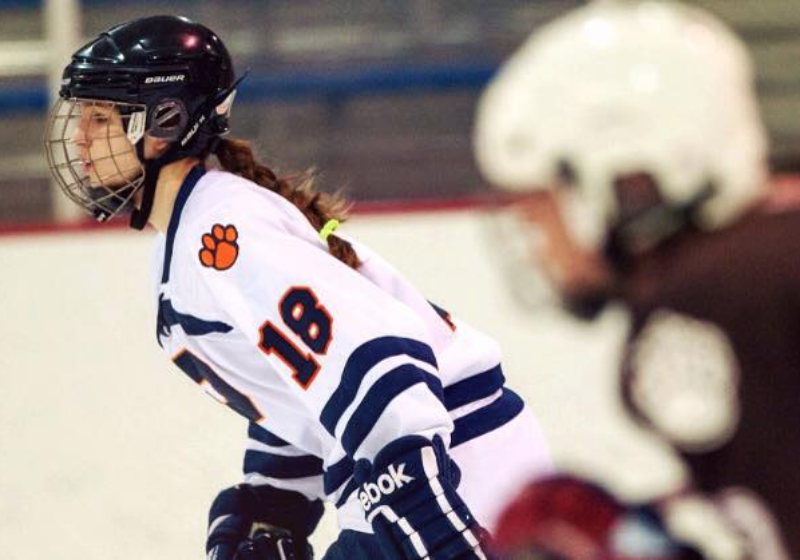Despite playing a sport dominated by the opposite gender, sophomore Anna Bidstrup has carved a striking path through ice hockey: She’s the sole female member of the UR Men’s Club Hockey team this year.
After the collapse of the women’s team, the longtime player was finally granted permission to join the men after being denied a spot on the roster last season.
From her earliest exposure, to her most recent endeavors in the sport, Bidstrup has always been outnumbered (and outsized) by her male counterparts. At the age of seven, the D.C. native was attracted to the sport’s fast-paced and competitive nature. She expressed interest in playing alongside two of her friends, whose mother played Division I hockey for St. Lawrence University and would coach the girls for the majority of their career.
“I never saw a girl play hockey before I started playing,” Bidstrup said.
She would continue to play all the way into ninth grade, when she joined the boy’s team at her high school and picked up a new sport: field hockey.
Upon the discovery that she was a natural at it, she decided to focus on pursuing a potential college field hockey career. Unfortunately, her advances in Division I recruiting would come to an abrupt halt due to a labral tear of her hip, an injury sustained in her junior year of high school.
As the injury improved, she began to consider playing Division III field hockey in college, drawn to it by its more “relaxed” nature in comparison to the commitments associated with Division I. She worried, though, about sports controlling her college life, and so decided to give up varsity sports and take up club athletics.
At the start of her sophomore year at UR, Bidstrup began playing with the men’s hockey team.
“The guys are really nice,” she said. “They all know my name, and they kind of see me as a little sister, which isn’t bad.”
When asked about how she would like to be seen by her teammates, Bidstrup added, “I would like to be seen as their equal.”
Bidstrup cites her size disadvantage as the biggest challenge she faces in a male sport.
Heavier body contact and aggression are notoriously more common in men’s hockey than in women’s. The conflicting styles of play have often left her struggling to decide which she should act on, especially in an environment where she feels pressure to “act like the guys.”
“Hockey logic tells me to play the puck, but in one-on-one situations I’ll play the body because I know that’s what guys like to see,” she said. “Guys are all about the hitting.”
While it is possible for men to be unpenalized for a career-ending hit to an opponent, women’s hockey remains a non-contact sport.
“They know they can’t hit me,” she said. “They’re aggressive, but they never lay me out. While I prefer to not be hit, I know that part of being treated equally is being hit […] I guess men are just made to sustain more hit and power.”
Despite these challenges, Bidstrup’s love of the sport has prevailed.
“It’s nice to have an activity to do,” she said. “You can run, you can bike, but ice hockey is a really fun workout and it’s exhilarating […] you get to go fast.”
To her surprise, Bidstrup’s teammates have told her that they enjoy watching women’s college hockey due to the sharper, more fined-tuned skills of its players. It would seem that others would agree, with the recent establishment of the National Women’s Ice Hockey League last March.
“When it happened last year, I was like, ‘this is huge, this is a big step,” she said.
She admits, however, that there is room for improvement due to a lack of interest outside of the sports community, and the general population’s unawareness of the significant milestone. She also feels the recent improvements in safety regulations, as a whole, are up to par.
“In high school, if you hit someone from behind you are immediately kicked out,” she said. In my high school, that was a rule.”
This passion for growing the game has led Bidstrup to pursue coaching, allowing her to encourage young girls to take up the sport that changed her for the better.
“The main group that I enjoyed coaching was the younger kids,” she said. “I had boys that I coached who had little sisters [who] would come to watch the practice, and I could talk to the parents and tell them that they should put her on skates.”
While some would be hesitant to put their daughters in a sport seen as being plagued by violence and size disparity, she never fails to see its merit.
“Hockey and hiking are similar to me in the way that, once you start, you kind of get hooked, and then you can do it forever,” she said. “You never forget how to play hockey […] it’s eternal, it’s always going to be with me, which is kind of cheesy, but it’s true.”
Bidstrup, a public health and economics major, plans to become involved in health policy and says she could potentially see her love for hockey and health intersecting in the future, particularly with concussion education and prevention.
Sports Editor Jackie Powell contributed reporting to this piece.




